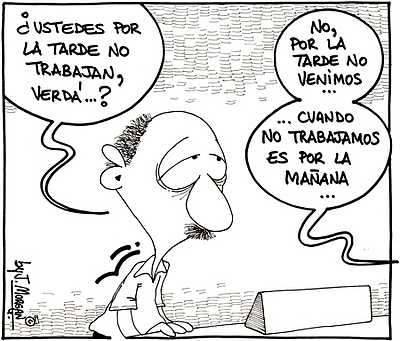 |
| © 2012 CampoPulse |
That's what's been happening to Prospero these days: getting entangled in the web of bureaucracy on his own behalf and on behalf of others. The new laws about health coverage, residence, social security, etc. etc. are so muddled, it is like swimming through treacle (to use an American expression that's more difficult for Abbé to illustrate). One ministry doesn't appear to know what the other one's doing. But that's not the only thing. The following is something that is herewith 'Another reason Spain is in such a mess', our occasional articles under that title. It sounds like an old joke, but it isn't - it's old, but no joke, not really. Here goes: SOON YOU WON'T BE ABLE TO READ THE REST OF ARTICLES LIKE THIS UNLESS YOU SUBSCRIBE>>>
Sitting at the National Police Extranjería section in La Línea (extranjero=stranger=foreigner, but stranger things have been known) are one Chinese lady, one very dignified elderly man from Senegal, one young man from Morocco, a couple from somewhere it would have been fun to identify while waiting, but they spoke in perfect Andaluz, a whole family of six also from Morocco, and Prospero, who is from withing the European Union (if not the EuroZone, but that's another story).
Prosp arrived at 09.38 and was at the end of the queue as described above. Fine.
Three quarters of an hour for a coffee break
As anyone who's had to go through all this will know, the 'strangers' office only opens from 09.00 to 12.00. That was three hours when Prosp went to school, and chances are it hasn't changed much, even accounting for inflation. But here comes the rub.
By 10.00 there were another ten or twelve people behind him. At 10.04 the only lady behind one of the two desks, having attended to the large Moroccan family, got up and left the office, not without telling the queue (that was already making it difficult to breathe in the tiny space) that there could be no more than four people inside, the rest would have to wait outside.
She returned at 10.48, which by Prosp's watch makes it 44 minutes for a coffee break. We knew it was a coffee break because another woman from, we assume, another department, had come to remind her of it at just after 10.
She continued to attend to the large Moroccan family, who had been out to get photos taken of their several small children while coffee break was being had. That was okay, but protestations might have arisen had it been a single person (as it is, we were glad to be rid of the snivelling, whining children).
Is Spain likely to turn into Greece?
While waiting around, one gets into conversation with people. In this case, there wasn't a great deal of it about unless one speaks Chinese, Arabic, Senegalese or about anything else. However, a pretty female head poked through the doorway at some point, asking in American English if there was anyone at the desk. 'Coffee break,' piped up Prospero, who was exceedingly bored at the time. When the same pretty head popped through for the fifth time, it was heard to say, 'How can they work like this?'
On his way out, Prosp asked the pretty faced girl, who was in the company of a not very pretty male faced man, where she was from. She answered, 'Greece.' Left without an appropriate answer, he smiled wanly and fled down the stairs into the rain, having discovered that his umbrella had been stolen from a rail on which he had been ordered to leave it by the 12 year old cop at the door.
Now for the serious bit
The funcionario mentality needs to change.
 |
| 'You don't work in the afternoon, do you?' 'No, we don't come in in the afternoon. It's in the morning we don't work.' |
Years ago it was worse, admittedly: you could bounce from window to window and desk to desk endlessly for even the most menial, but necessary, document, permit or whatever. It was 'the power of the little man' gone crazy (they were mostly of the male persuasion, however much one had slandered their parenthood. It had little to do with size, though there seemed to be a mould somewhere that spewed out similar looking men at these jobs: short, bald, with a thin moustache and wearing nylon shirts).
At the time, Spain needed to offer employment so the civil service was filled largely by those left behind in the general exodus to work in Germany, France, or Catalonia (Cataluña is a world apart, as any Catalan will tell you). But then, you had to be on the right side of the Franco regime to get any kind of official job at the time, and it was Franco's miens who created ministries, departments, sections and despachos (offices) and above all jobs for the boys.
At the time, Spain needed to offer employment so the civil service was filled largely by those left behind in the general exodus to work in Germany, France, or Catalonia (Cataluña is a world apart, as any Catalan will tell you). But then, you had to be on the right side of the Franco regime to get any kind of official job at the time, and it was Franco's miens who created ministries, departments, sections and despachos (offices) and above all jobs for the boys.
Nowadays, though, it is not the fault of the funcionarios, but that of their managers all the way up to whatever ministry, department, sections or despacho they work for.
Alas the mentality, or attitude if you prefer, appears to have settled into the genetic makeup of most Mediterranean countries. One might as well blame the Romans and their efficient bureacracy.
The thing is, the Romans had slaves, and if a bureaucrat didn't like it, slave or not, he or she (no, make that he only), they went to the galleys. The galleys might have been the reason why most bureaucrats 'need' a month's holiday today. Travel abroad, and such. Who knows.
Back to the straight and narrow.
We know and accept that most civil servants are hard done by. We know that those in Spain work longer hours than in many other countries ... no, hang on, remove the word work back there.
What ought to be happening is that the time spent at the office or wherever, is used more efficiently. Why isn't it?
Plugging in
Anyone living in Spain for more than a couple of years will know the concept if not the word enchufismo. One dictionary translates it as 'string-pulling' or 'good personal contact' and, of course, 'wall plug' (enchufe), which is closer to what we mean. Another definition might be closer to 'nepotism' (patronage bestowed or favouritism shown on the basis of family relationship, as in business and politics, says another dictionary) but in its wider sense. For example, belonging to the same political party, or neighbourhood, or union.
The above is less apparent these days, but it is prevalent despite the awesome oposiciones -- exams that applicants for lifetime public-sector jobs must pass. The exams are held every year, every other year or every five years, depending on the speciality. The candidates (opositores) must sit a series of written exams and/or attend interviews. Some applicants can spend years studying for and resitting exams. All public-sector appointments that are open to competition are published in the BOE, the official government publication. But naturally there are many ways round this if you have the right enchufe, specially at regional or local, municipal level.
The result is that middle level management in public service situations is largely absent. Either physically (there have been many cases of salaries being paid to people who have never turned up for work at all, sometimes for years) or managerially. Who would dare tell the boss's third cousin thrice removed to have a shorter coffee break?
Cooks spoiling broths
And then, of course, there are too many ministries, departments, municipalities and general divisions at all levels. A multiplicity of these means that they is little if any coordination, or cooperation even, between them all.
This brings us right back to Prospero sitting at the strangest place in La Línea police station. Did he manage to get anything done, even when he displayed all his charms (sit down, missus, they are not what you're thinking)? No, the people whose papers he was trying to get sorted have to come back another day, in person.
 |
| Taking the dreaded oposiciones |
The result is that middle level management in public service situations is largely absent. Either physically (there have been many cases of salaries being paid to people who have never turned up for work at all, sometimes for years) or managerially. Who would dare tell the boss's third cousin thrice removed to have a shorter coffee break?
Cooks spoiling broths
And then, of course, there are too many ministries, departments, municipalities and general divisions at all levels. A multiplicity of these means that they is little if any coordination, or cooperation even, between them all.
This brings us right back to Prospero sitting at the strangest place in La Línea police station. Did he manage to get anything done, even when he displayed all his charms (sit down, missus, they are not what you're thinking)? No, the people whose papers he was trying to get sorted have to come back another day, in person.


No comments:
Post a Comment
Thank you for taking the time to comment. It will be published as soon as it is moderated and/or edited.